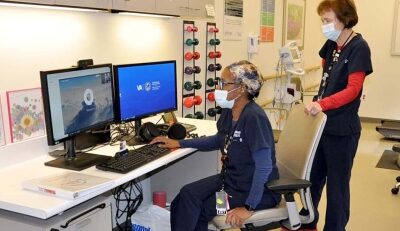An expert panel has identified quality measures for ambulatory primary care for VHA patients who have complex care needs and are at high risk for adverse outcomes, such as hospitalization or death, according to a new study.
Minimally Invasive Surgery Is Safe, Feasible Option for Diverticulitis
Patients with right colon diverticulitis can consider minimally invasive surgery a safe, feasible treatment option, according to a recent study.
NAFLD to MAFLD? New Terminology Urged for Fatty Liver Disease
International experts recommend replacing the disease acronym nonalcoholic fatty liver disease (NAFLD) with metabolic (dysfunction)-associated fatty liver disease (MAFLD); the new terminology would allow additional reasons for liver disease and more clearly specifies the probable reason for illness, according to a recent veterans study.
GI Symptoms, IBS Are More Prevalent Among Veterans with PTSD
Irritable bowel syndrome (IBS) is a syndrome characterized by abdominal pain and altered bowel habits.
VA OIG: Lack of Oversight Found in DO’s Sexual Abuse at Beckley VAMC
This is just the latest finding by the OIG that places blame for a recent criminal case on lack of VA oversight.
Psychologist Colleen Richardson Makes Sure VA Properly Cares for Caregivers
During her four years of active duty with the Navy, Colleen Richardson, PsyD, saw the immediate effects of trauma first-hand. In 2008, as the first woman Operational Stress Control and Readiness Provider embedded with the 1st Marine Division’s Regimental Combat Team, the clinical psychologist provided mental health care to servicemembers on the front lines in Iraq.
Adverse Health Outcomes Vary by Soldiers’ Specialized Combat Experiences
Experiencing combat during deployment has been associated with adverse health outcomes including mental health problems, sleep problems and alcohol misuse.
Marijuana Laws Linked to Increasing Cannabis-Use Disorder in Veterans
As laws and attitudes about marijuana use have been relaxed over the past two decades, the substance has become widely regarded by society as innocuous.
COVID-19 Telehealth Changes Improve VA Treatment for Opioid-Use Disorder
Implementing new policies during the COVID-19 pandemic reduced barriers to telehealth delivery of buprenorphine treatment for opioid-use disorder for veterans seeking care, a new study reports.
Survey: Post-9/11 Veterans More Likely to Exercise, Eat Right Than Civilians
BOSTON — Recent U.S. veterans reported similar or better outcomes than nonveterans when it comes to their health, vocational, financial and social well-being. That is in contrast to some earlier cohorts who had served in the military and lagged behind civilians in some domains.
Prior to PACT Act, VA Prematurely Denied Most Burn Pit Claims
With the passage of the PACT Act last month, Congress is demanding that VA put burn pit exposure at the forefront of its healthcare and benefits processes.
Better late than never
Pam and I are presently hiding from the heat of summer 2022 in the lakes region of central Maine. Pam’s family has maintained a cabin in the area for over 100 years. We are indeed fortunate to have the means to travel to cooler climates within the United States. At the same time, so many Americans must withstand the daily onslaught of over 90° F temperatures.
Colonoscopy Findings Can Offer Clues to Future Non-CRC Mortality
A new study from the Durham, NC, VAMC and Duke University argued that an opportunity to improve health status is being missed by focusing only on cancer screening.
Cancer Data Misleading When Asians Are Aggregated With Pacific Islanders
While federal guidelines have called for separating data for Native Hawaiian and other Pacific Islander individuals from data for Asian individuals, the cohorts often are aggregated or excluded completely in medical research, according to a new study.
Study Calls for Greater Use of Fecal Immunochemical Testing for CRC
Backlogs in high-volume gastrointestinal endoscopic procedures, such as colonoscopy occurred during the current COVID-19 pandemic, especially in the early days.
Legislators: VA’s Whistleblower Protection Office Is Falling Short
Bipartisan legislation currently being drafted in the House is attempting to clarify the role of VA’s Office of Whistleblower Protection (OAWP), an organization that has been fraught with challenges since it was established in 2017.
COVID-19 Could Be Especially Risky for Veterans With Sickle Cell Trait
The presence of sickle cell trait (SCT) should be considered an adverse prognostic factor for COVID-19, according to a new study.
VA Focuses on Issue of Widespread Food Insecurity Among Veterans
Prior to the COVID-19 pandemic, approximately 11% of veterans were living in a food-insecure household, and 5.3% lived in a household with very low food security, meaning that eating patterns were disrupted and food intake reduced.
VA’s Stroke Care Quality, Outcomes Not Affected by COVID-19 Pandemic
The overall quality of care for stroke patients in the nation’s largest healthcare system did not decline during the COVID-19 pandemic, according to a new study.
Reforms Put Caregiver Assistance in Danger for Most Post 9/11 Veterans
In a case of unintended consequences, as many as 90% of post 9/11 veterans currently enrolled in the VA’s Program of Comprehensive Assistance for Family Caregivers (PCAFC) were in danger of being discharged due to an ongoing wave of eligibility reforms.
VHA Pulse Oximeters Over-Estimated Oxygenation in Some Racial/Ethnic Groups
Research from the University of Michigan, Johns Hopkins and other medical centers has been raising concerns about the accuracy of pulse oximeters in certain racial groups almost since the COVID-19 pandemic began.
More Needs to Be Done Despite VA’s ‘Vast’ Efforts to Improve COPD Outcomes
The prevalence of chronic obstructive pulmonary disease among veterans is estimated to be between 8% and 19%—significantly higher than in the general population
Airway Abnormalities in Post-9/11 Deployed Military Personnel Detected by Quantitative Imaging Analysis
Quantitative imaging analysis has been able to detect airway abnormalities in military personnel with persistent respiratory symptoms, offering a new, effective tool to diagnose and monitor patients with deployment-related lung disease, according to a recent study.
Pharmacogenomic Testing Had Positive Results for Major Depression Patients
Pharmacogenomic testing can help clinicians avoid prescribing antidepressant medications that might have undesirable outcomes.
Blood Sugars Higher for Flu Vaccine Recipients With Diabetes
The Vaccine Adverse Effect Reporting System, established by the national Centers for Disease Control and Prevention, has more than 350 reports of hyperglycemia post-influenza vaccine, according to a new study.
Elderly Veterans More Likely to Die from COVID-19 Than Flu
An often repeated misconception during the COVID-19 pandemic is that the Sars-C0V-2 and influenza viruses are similarly fatal for older adults, although there have been limited data to support that observation.
Hemorrhagic Mortality A Problem for APL Patients
Even though the rate of complete remission of acute promyelocytic leukemia (APL) is currently more than 90% because of the use of all-trans retinoic acid (ATRA) with arsenic trioxide (ATO), hemorrhagic mortality has emerged as the most significant barrier to APL-induced remission, according to a new study.
Yellow Fever Vaccine Response Lower After Flu Vaccine
The DoD’s support of the United States government’s response to the Ebola crisis in Liberia, beginning in 2014‐2015, was the first U.S. military operation to support a disease‐driven foreign humanitarian assistance mission.
Clonal Hematopoiesis Does Not Predict Severe COVID-19
COVID-19 cases range dramatically from severity, from asymptomatic to self-limited influenza-like illness to severe respiratory failure or even death.
Pediatric ALL Survivors Have High Follow-Up Screening Rates in MHS
Does universal access to healthcare make any difference in health screening for pediatric acute lymphoblastic leukemia (ALL) survivors?





